1995 年 1 月英语六级真题及答案
Part I Listening Comprehension (20 minutes)
Section A
1.
A) She was given a new job.
B) She was given a raise.
C) She was criticized for being late.
D) She was praised for her hard work.
2.
A) Whether to employ the woman.
B) Whether to take up the new job.
C) Whether to ask for a raise.
D) Whether to buy a new house.
3.
A) A teacher.
B) A psychologist.
C) A librarian.
D) A publisher.
4.
A) To visit more places in the city.
B) To take a lot of pictures of the beautiful city.
C) To take some pictures of his friends.
D) To spare some time to meet his friends.
5.
A) In town.
B) Out of town.
C) In the man’s house.
D) Outside Ann’s house.
6.
A) Because she feels very hot in the room.
B) Because she wants to avoid meeting people.
C) Because she wants to smoke a cigarette outside.
D) Because she doesn’t like the smell of smoke inside.
7.
A) Painters hired by the man and woman.
B) Painters hired by Mr. Jones.
�
C) Mr. Jones.
D) The man and the woman.
8.
A) The woman enjoyed the movie very much.
B) The woman saw a horror movie.
C) The man asked the woman to be careful at night.
D) The man went to the show with the woman.
9.
A) He doesn’t write well enough.
B) He is not a professional writer.
C) He hasn’t got any professional experience.
D) He didn’t perform well in the interview.
10. A) He doesn’t think it necessary to refuel the car.
B) He can manage to get the gasoline they need.
C) He hopes the woman will help him select a fuel.
D) He thinks it is difficult to get fuel for the car.
Section B
Questions 11 to 13 are based on the passage you have just heard.
Passage One
11. A) Because they can’t afford to.
B) Because they think small houses are more comfortable to live in.
C) Because big houses are usually built in the countryside.
D) Because they prefer apartments.
12. A) Because many young people have moved into comfortable apartments.
B) Because many old houses in the bad part of the town are not inhabited.
C) Because many older people sell their houses after their children leave.
D) Because many people have quit their old house to build new ones.
13. A) They have to do their own maintenance.
B) They have to furnish their own houses.
C) They will find it difficult to make the rest of the payment.
D) They will find it difficult to dispose of their old-style furniture.
Passage Two
�
Questions 14 to 16 are based on the passage you have just heard.
14. A) They are not active hunters.
B) They don’t sleep much.
C) They are often seen alone.
D) They don’t eat much.
15. A) To catch the birds.
B) To look for shade in the heat of the day.
C) To catch other animals.
D) To look for a kill made by another animal.
16. A) They are larger in size.
B) They have to hunt more to feed the young.
C) They run faster.
D) They are not as lazy as the males.
Questions 17 to 20 are based on the passage you have just heard.
Passage Three
17. A) Less than 30 minutes.
B) From 30 to 45 minutes.
C) At least 45 minutes.
D) More than 45 minutes.
18. A) He should show respect for the interviewer.
B) He should show confidence in himself.
C) He should talk enthusiastically.
D) He should be dressed properly.
19. A) Speaking confidently but not aggressively.
B) Talking loudly to give a lasting impression.
C) Talking a lot about the job.
D) Speaking politely and emotionally.
20. A) Professional knowledge is a decisive factor in job interview.
B) Finding a job is more difficult than one can imagine.
C) A job seeker should create a good image during an interview.
�
D) Self-confidence is most important for a job seeker.
Part II Reading Comprehension (35 minutes)
Questions 21 to 25 are based on the following passage.
The process of perceiving other people is rarely translated (to ourselves or others)
into cold, objective terms. “She was 5 feet 8 inches tall, had fair hair, and wore
a colored skirt.” More often, we try to get inside the other person to pinpoint his
or her attitudes, emotions, motivations, abilities, ideas and characters. Furthermore,
we sometimes behave as if we can accomplish this difficult job very quickly-perhaps
with a two-second glance.
We try to obtain information about others in many ways. Berger suggests several
methods for reducing uncertainties about others: watching, without being noticed, a
person interacting with others, particularly with others who are known to you so you
can compare the observed person’s behavior with the known others’ behavior; observing
a person in a situation where social behavior is relatively unrestrained or where a
wide variety of behavioral responses are called for; deliberately structuring the
physical or social environment so as to observe the person’s responses to specific
stimuli; asking people who have had or have frequent contact with the person about him
or her; and using various strategies in face-to-face interaction to uncover information
about another person-questions, self-disclosures(自我表露), and so on. Getting to know
someone is a never-ending task, largely because people are constantly changing and the
methods we use to obtain information are often imprecise. You may have known someone
for ten years and still know very little about him. If we accept the idea that we won’t
ever fully know another person, it enables us to deal more easily with those things
that get in the way of accurate knowledge such as secrets and deceptions. It will also
keep us from being too surprised or shocked by seemingly inconsistent behavior.
Ironically (讽刺性地) those things that keep us from knowing another person too well
(e.g., secrets and deceptions) may be just as important to the development of satisfying
relationship as those things that enable us to obtain accurate knowledge about a person
(e.g., disclosure and truthful statements).
21. The word “pinpoint” (Para. 1, Line 3) basically means ________.
A) appreciate
B) obtain
C) interpret
D) identify
22. What do we learn from the first paragraph?
A) People are better described in cold, objective terms.
B) The difficulty of getting to know a person is usually underestimated.
C) One should not judge people by their appearances.
�
D) One is usually subjective when assessing other people’s personality.
23. It can be inferred from Berger’s suggestions that ________.
A) people do not reveal their true self on every occasion
B) in most cases we should avoid contacting the observed person directly
C) the best way to know a person is by making comparisons
D) face-to-face interaction is the best strategy to uncover information about a
person
24. In developing personal relationships, secrets and deceptions, in the author’s
opinion, are ________.
A) personal matters that should be seriously dealt with
B) barriers that should be done away with
C) as significant as disclosures and truthful statements
D) things people should guard against
25. The author’s purpose in writing the passage is ________.
A) to give advice on appropriate conduct for social occasions
B) to provide ways of how to obtain information about people
C) to call the reader’s attention to the negative side of people’s characters
D) to discuss the various aspects of getting to know people
Questions 26 to 30 are based on the following passage.
The competition among producers of personal computers is essentially a race to get
the best, most innovative products to the marketplace. Marketers in this environment
frequently have to make a judgement as to their competitors’ role when making marketing
strategy decisions. If major competitors are changing their products, then a marketer
may want to follow suit to remain competitive. Apple Computer, Inc. has introduced two
new, faster personal computers, the Mackintosh II and Mackintosh SE, in anticipation
of the introduction of a new PC by IBM, one of Apple’s major competitors.
Apple’s new computers are much faster and more powerful than its earlier models.
The improved Mackintosh is able to run programs that previously were impossible to run
on an Apple PC, including IBM-compatible(兼容的) programs. This compatibility feature
illustrates computer manufactures’ new attitude of giving customers the features they
want. Making Apple computers capable of running IBM software is Apple’s effort at
making the Mackintosh compatible with IBM computers and thus more popular in the office,
where Apple hopes to increase sales. Users of the new Apple can also add accessories
(附件) to make their machines specialize in specific uses, such as engineering and
writing.
The new computers represent a big improvement over past models, but they also cost
much more. Company officials do not think the higher price will slow down buyers who
�
want to step up to a more powerful computer. Apple wants to stay in the high-price end
of the personal computer market to finance research for even faster, more sophisticated
computers.
Even though Apple and IBM are major competitors, both companies realize that their
competitor’s computers have certain features that their own models do not. The Apple
line has always been popular for its sophisticated color graphics(图形), whereas the
IBM machines have always been favored in offices. In the future, there will probably
be more compatibility between the two companies’ products, which no doubt will require
that both Apple and IBM change marketing strategies.
26. According to the passage, Apple Computer, Inc, has introduced the Mackintosh II
and the Mackintosh SE because ________.
A) IBM is changing its computer models continuously
B) it wants to make its machines specialize in specific uses
C) it wants to stay ahead of IBM in the competitive computer market
D) it expects its major competitor IBM to follow its example
27. Apple hopes to increase Mackintosh sales chiefly by ________.
A) making its new models capable of running IBM software
B) improving the color graphics of its new models
C) copying the marketing strategies of IBM
D) giving the customers what they want
28. Apple sells its new computer models at a high price because ________.
A) they have new features and functions
B) they are more sophisticated than other models
C) they have new accessories attached
D) it wants to accumulate funds for future research
29. It can be inferred from the passage that both Apple and IBM try to gain a competitive
advantage by ________.
A) copying each other’s technology
B) incorporating features that make their products distinctive
C) making their computer more expensive
D) making their computers run much faster
30. The best title for the passage would be ________.
A) Apple’s Efforts to Stay Ahead of IBM
B) Apple’s New Computer Technology
�
C) Apple’s New personal Computers
D) Apple’s Research Activities
Passage Three
Questions 31 to 35 are based on the following passage.
It is a curious paradox that we think of the physical sciences as “hard”, the
social sciences as “soft”, and the biological sciences as somewhere in between. This
is interpreted to mean that our knowledge of physical systems is more certain than our
knowledge of biological systems, and these in turn are more certain than our knowledge
of social systems. In terms of our capacity to sample the relevant universes, however,
and the probability that our images of these universes are at least approximately
correct, one suspects that a reverse order is more reasonable. We are able to sample
earth’s social systems with some degree of confidence that we have a reasonable sample
of the total universe being investigated. Our knowledge of social systems, therefore,
while it is in many ways extremely inaccurate, is not likely to be seriously overturned
by new discoveries. Even the folk knowledge in social systems on which ordinary life
is based in earning, spending, organizing, marrying, taking part in political
activities, fighting and so on, is not very dissimilar from the more sophisticated
images of the social system derived from the social sciences, even though it is built
upon the very imperfect samples of personal experience.
In contrast, our image of the astronomical universe, of even of earth’s geological
history, can easily be subject to revolutionary changes as new data comes in and new
theories are worked out. If we define the “security” our image of various parts of
the total system as the probability of their suffering significant changes, then we
would reverse the order of hardness and see the social sciences as the most secure,
the physical sciences as the least secure, and again the biological sciences as
somewhere in between. Our image of the astronomical universe is the least secure of
all simply because we observe such a fantastically small sample of it and its
record-keeping is trivial as compared with the rich records of the social systems, or
even the limited records of biological systems. Records of the astronomical universe,
despite the fact that we see distant things as they were long ago, are limited in the
extreme.
Even in regard to such a close neighbour as the moon, which we have actually visited,
theories about its origin and history are extremely different, contradictory, and hard
to choose among. Our knowledge of physical evolution is incomplete and highly insecure.
31. The word “paradox” (Para. 1, Line 1) means “________”.
A) implication
B) contradiction
C) interpretation
D) confusion
�
32. According to the author, we should reverse our classification of the physical
sciences as “hard” and the social sciences as “soft” because ________.
A) a reverse ordering will help promote the development of the physical sciences
B) our knowledge of physical systems is more reliable than that of social systems
C) our understanding of the social systems is approximately correct
D) we are better able to investigate social phenomena than physical phenomena
33. The author believes that our knowledge of social systems is more secure than that
of physical systems because ________.
A) it is not based on personal experience
B) new discoveries are less likely to occur in social sciences
C) it is based on a fairly representative quantity of data
D) the records of social systems are more reliable
34. The chances of the physical sciences being subject to great changes are the biggest
because ________.
A) contradictory theories keep emerging all the time
B) new information is constantly coming in
C) the direction of their development is difficult to predict
D) our knowledge of the physical world is inaccurate
35. We know less about the astronomical universe than we do about any social system
because ________.
A) theories of its origin and history are varied
B) our knowledge of it is highly insecure
C) only a very small sample of it has been observed
D) few scientists are involved in the study of astronomy
Questions 36 to 40 are based on the following.
In the early days of nuclear power, the United States made money on it. But today
opponents have so complicated its development that no nuclear plants have been ordered
or built here in 12 years.
The greatest fear of nuclear power opponents has always been a reactor “meltdown”
(堆内熔化). Today, the chances of a meltdown that would threaten U.S. public health
are very little. But to even further reduce the possibility, engineers are testing new
reactors that rely not on human judgement to shut them down but on the laws of nature.
Now General Electric is already building two advanced reactors in Japan. But don’t
expect them ever on U.S. shores unless things change in Washington.
The procedure for licensing nuclear power plants is a bad dream. Any time during,
or even after, construction, an objection by any group or individual can bring
�
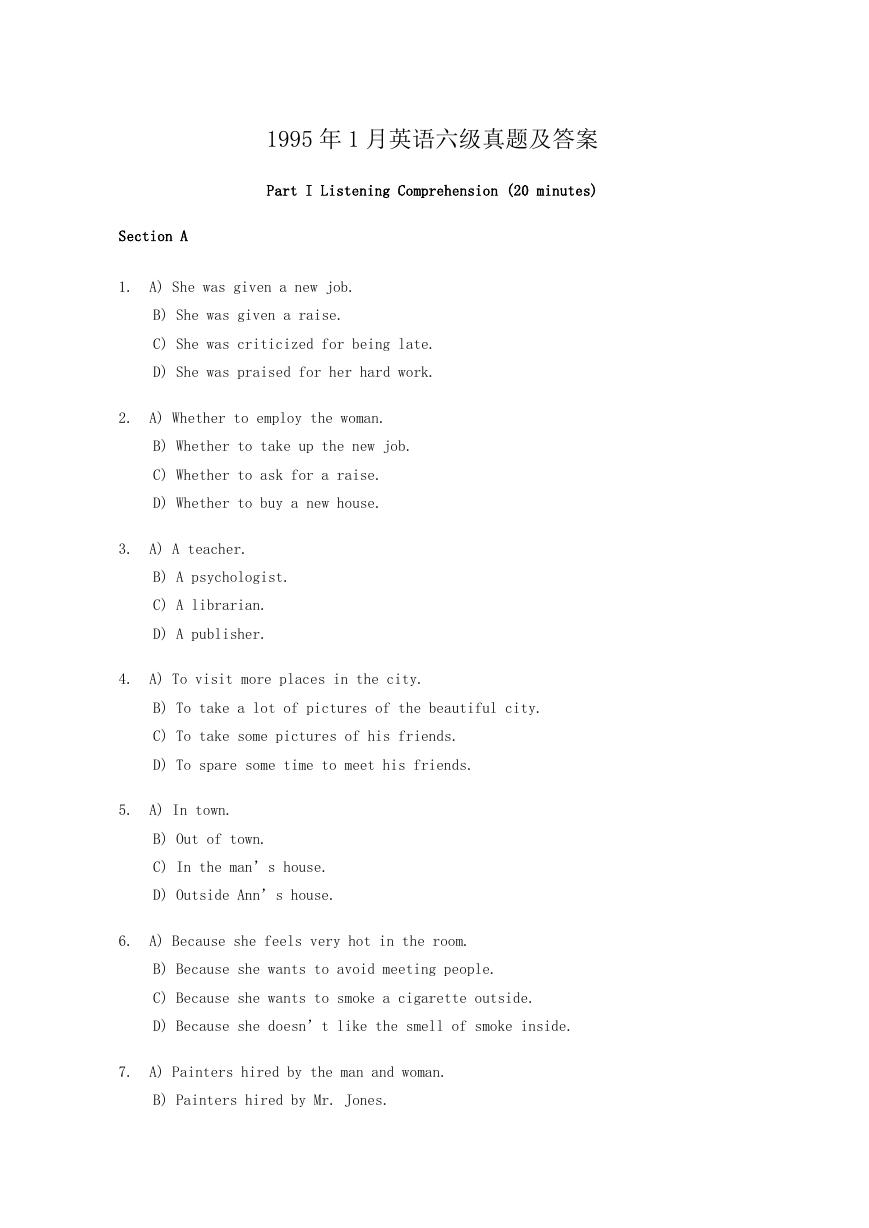
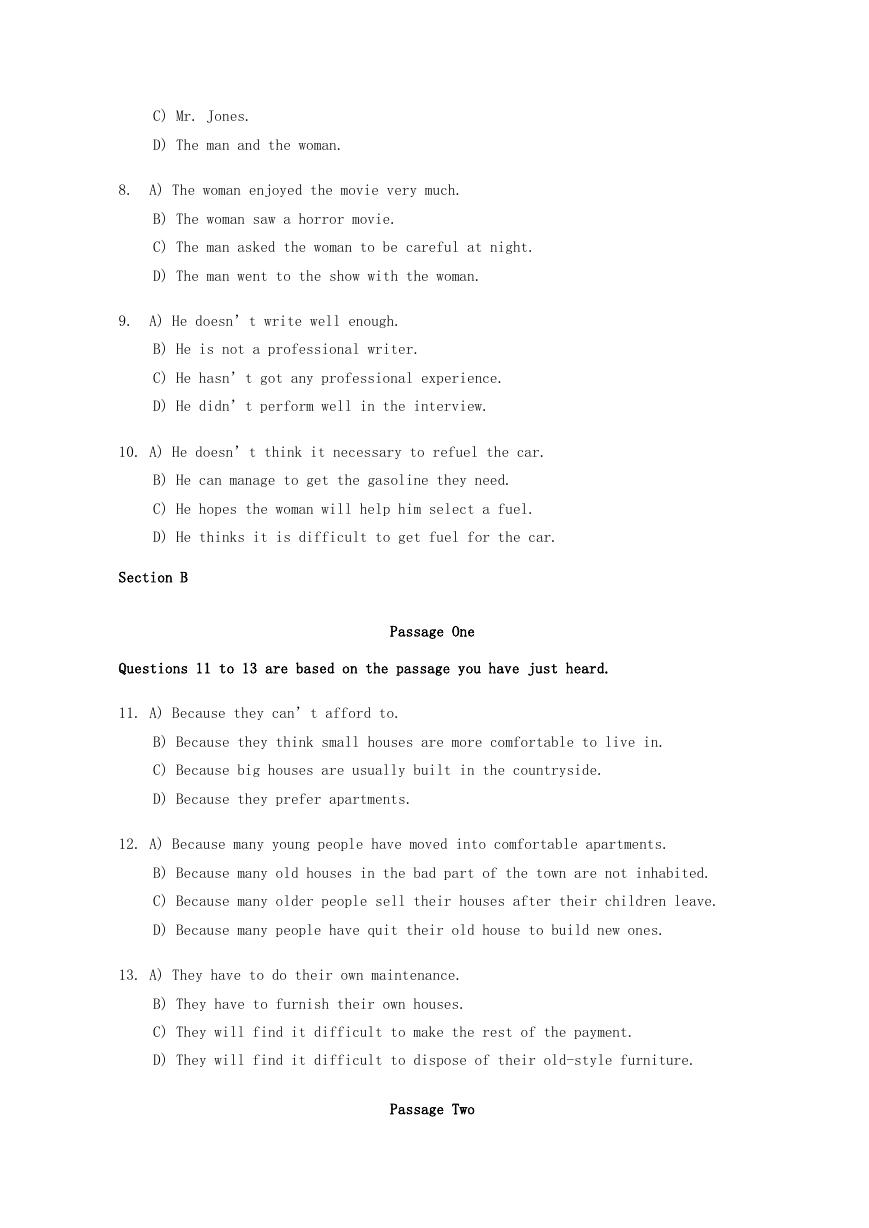
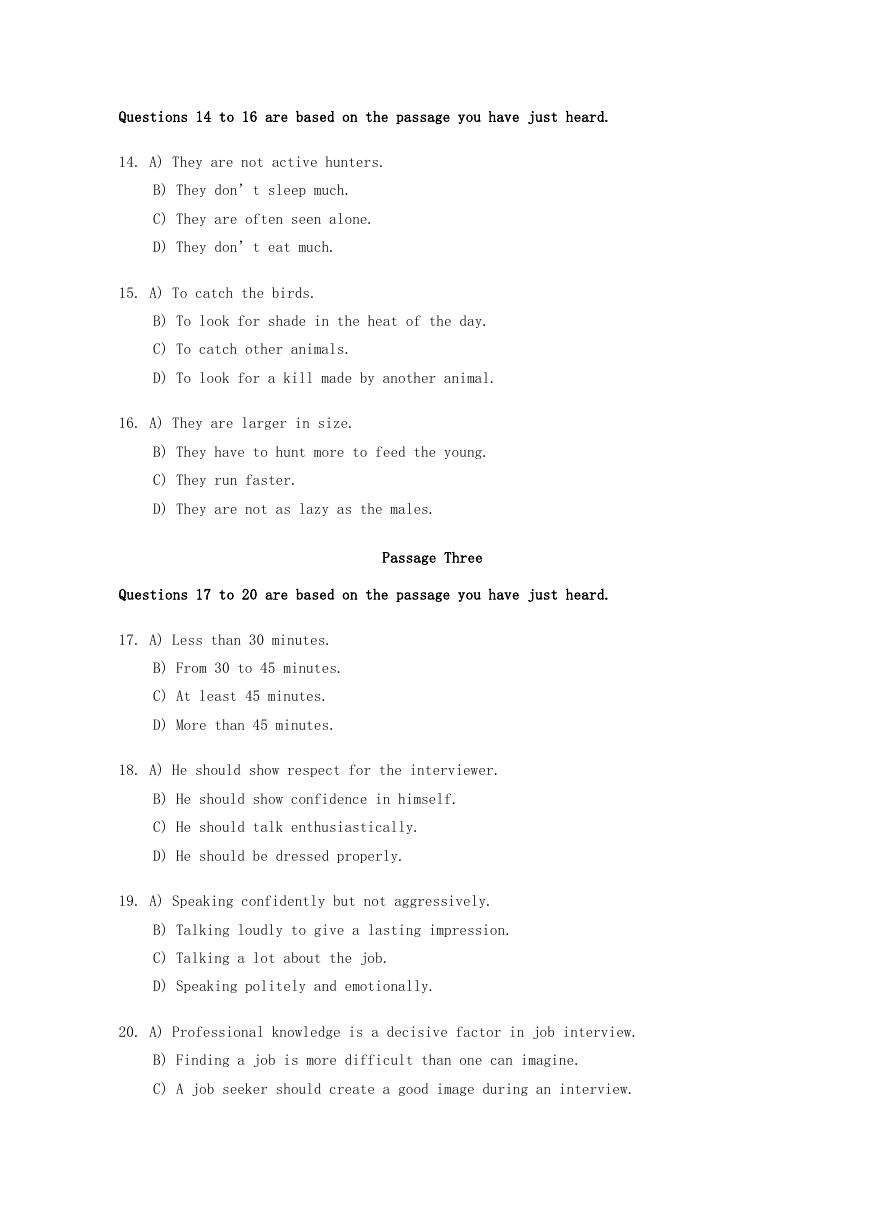
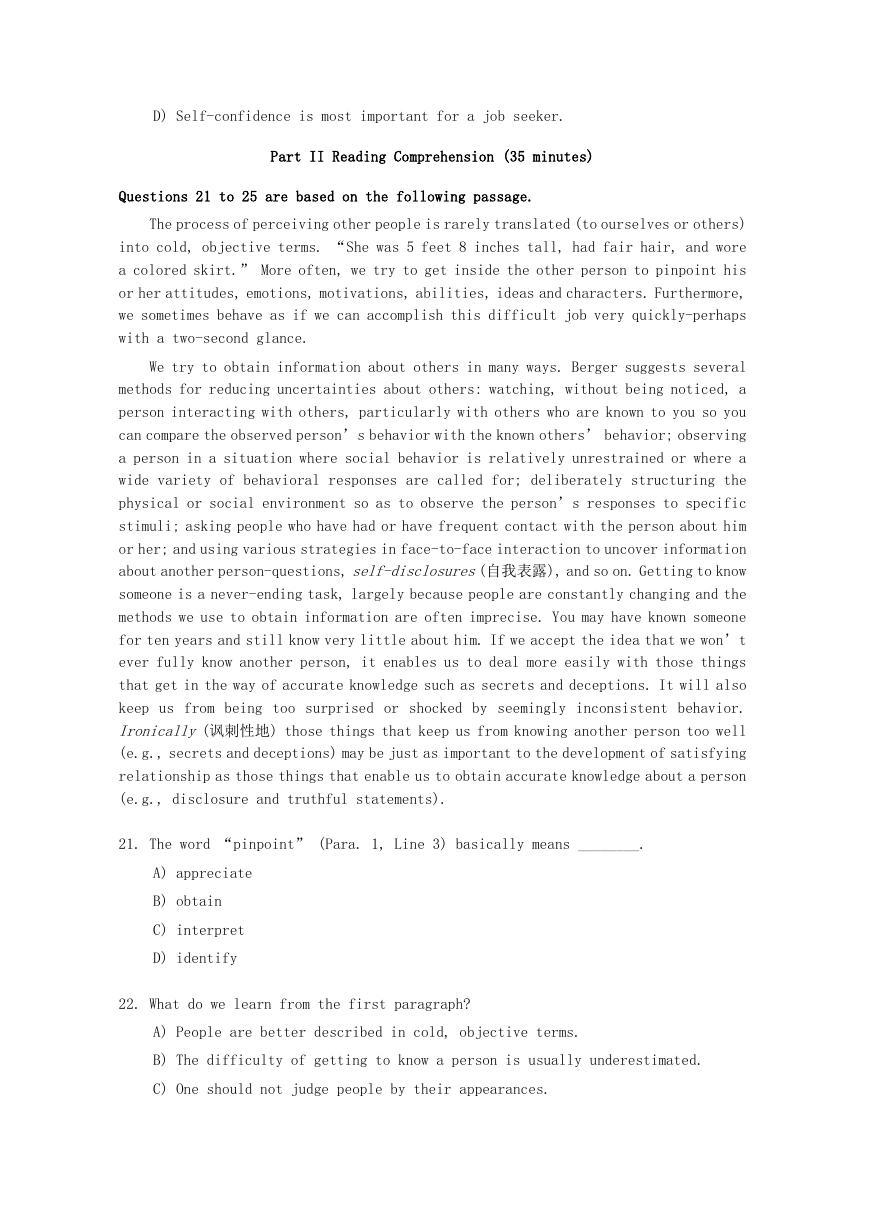

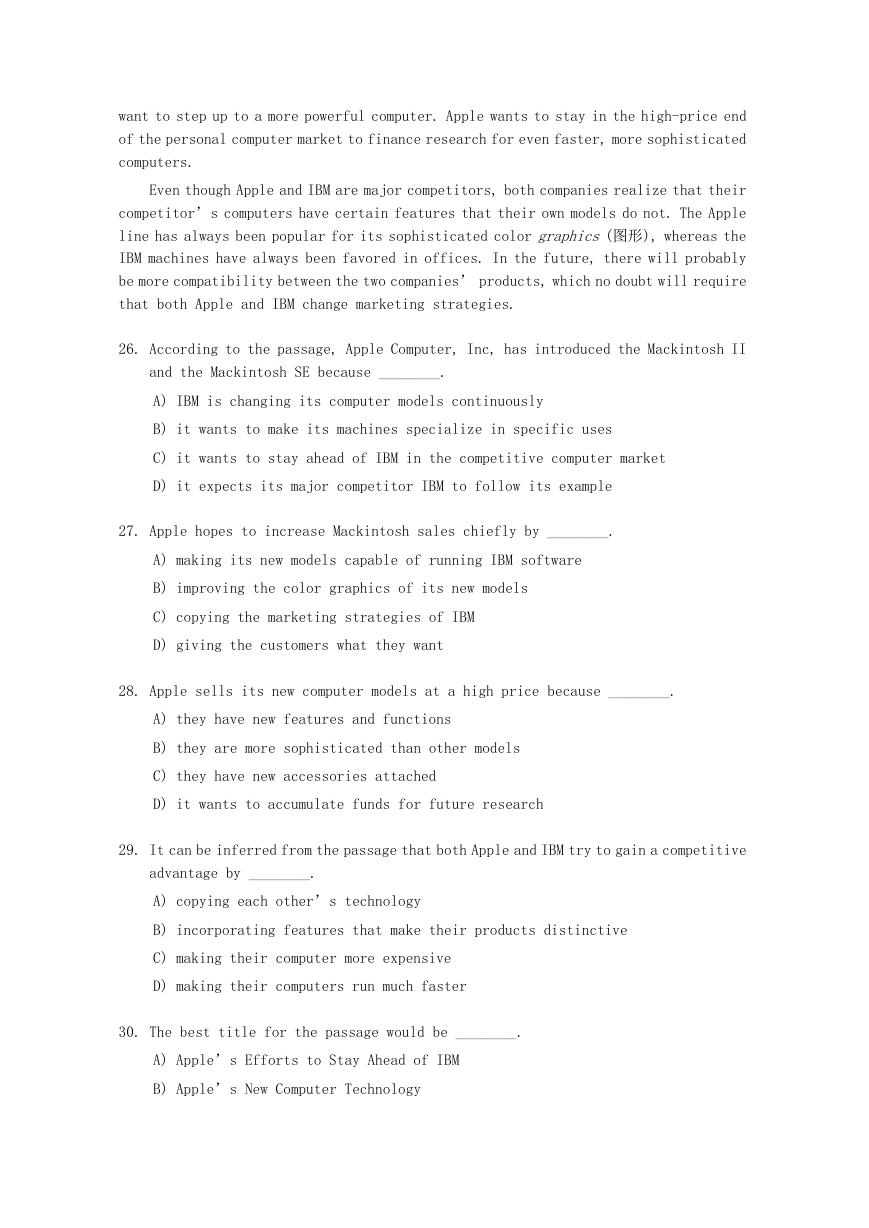
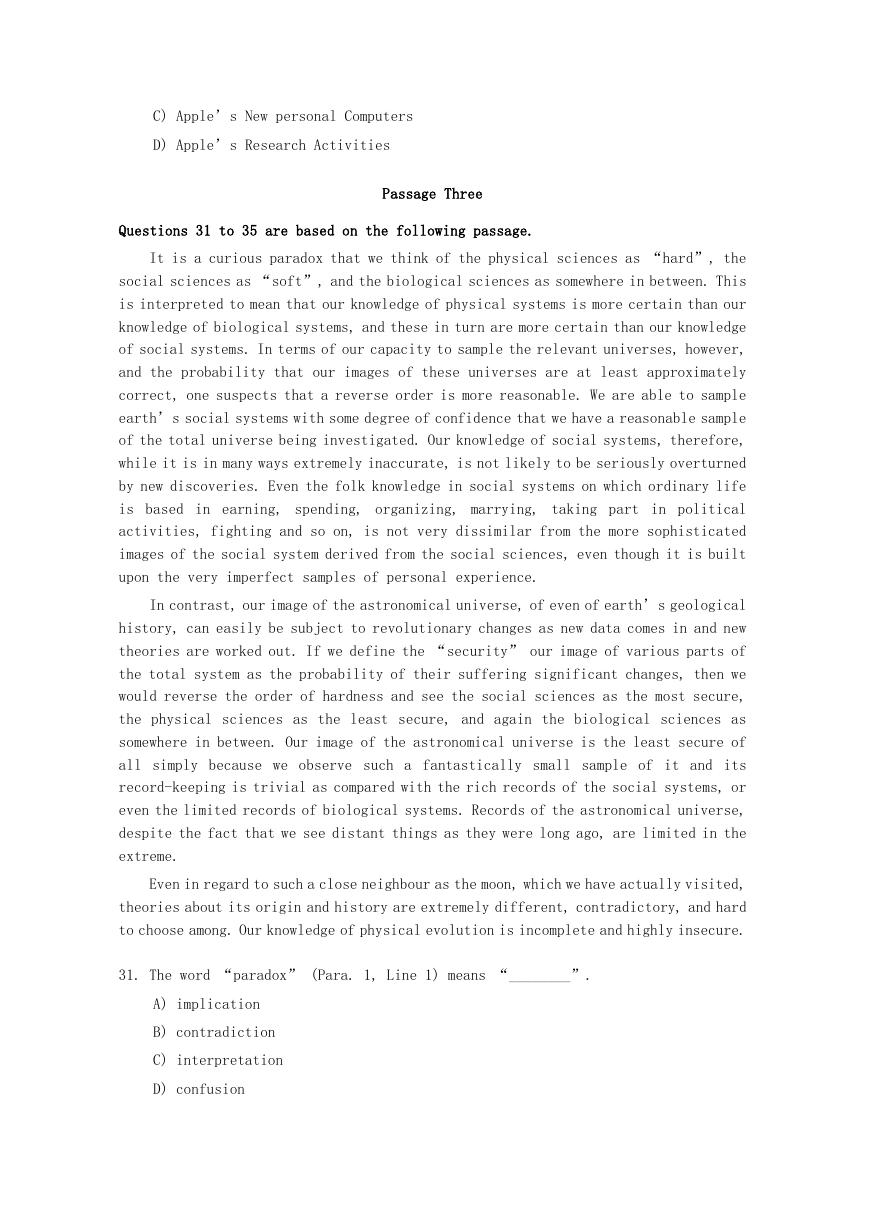
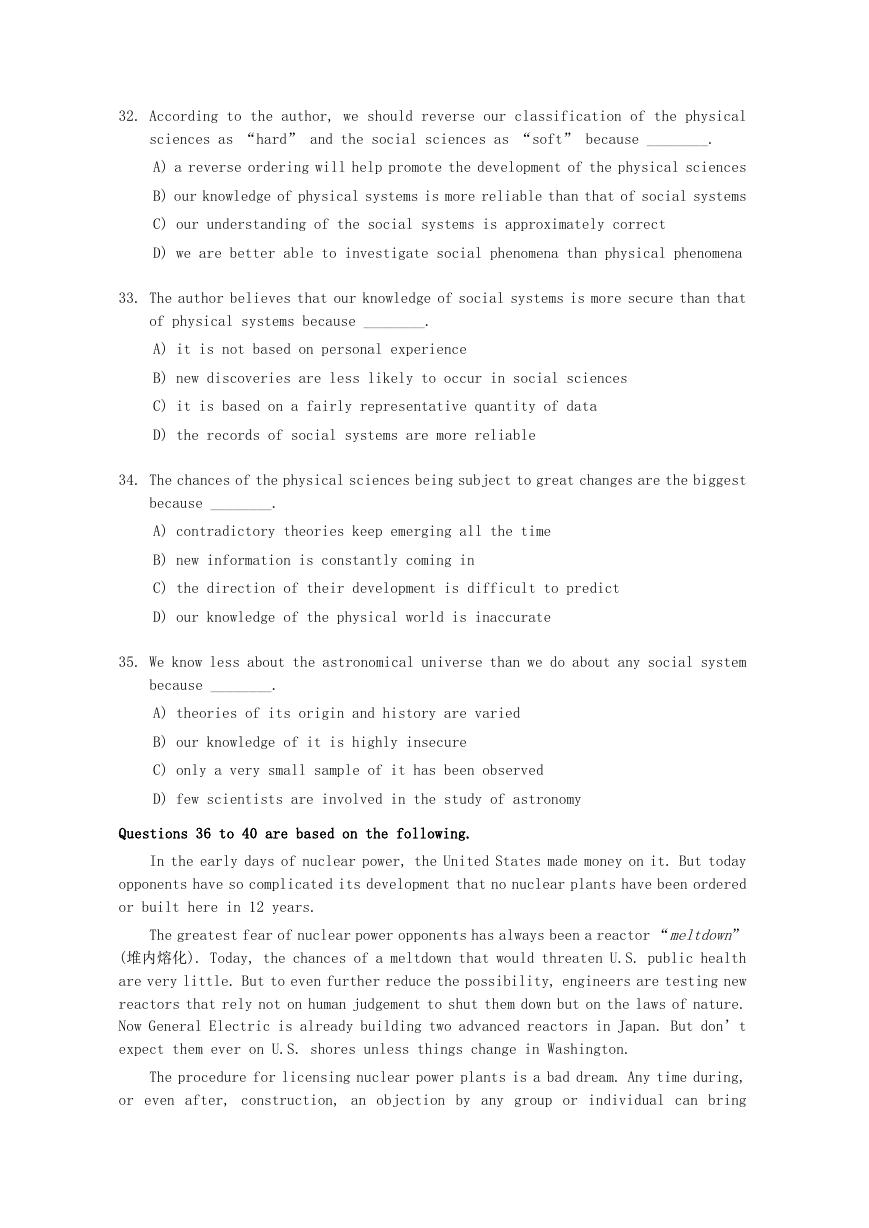








 2023年江西萍乡中考道德与法治真题及答案.doc
2023年江西萍乡中考道德与法治真题及答案.doc 2012年重庆南川中考生物真题及答案.doc
2012年重庆南川中考生物真题及答案.doc 2013年江西师范大学地理学综合及文艺理论基础考研真题.doc
2013年江西师范大学地理学综合及文艺理论基础考研真题.doc 2020年四川甘孜小升初语文真题及答案I卷.doc
2020年四川甘孜小升初语文真题及答案I卷.doc 2020年注册岩土工程师专业基础考试真题及答案.doc
2020年注册岩土工程师专业基础考试真题及答案.doc 2023-2024学年福建省厦门市九年级上学期数学月考试题及答案.doc
2023-2024学年福建省厦门市九年级上学期数学月考试题及答案.doc 2021-2022学年辽宁省沈阳市大东区九年级上学期语文期末试题及答案.doc
2021-2022学年辽宁省沈阳市大东区九年级上学期语文期末试题及答案.doc 2022-2023学年北京东城区初三第一学期物理期末试卷及答案.doc
2022-2023学年北京东城区初三第一学期物理期末试卷及答案.doc 2018上半年江西教师资格初中地理学科知识与教学能力真题及答案.doc
2018上半年江西教师资格初中地理学科知识与教学能力真题及答案.doc 2012年河北国家公务员申论考试真题及答案-省级.doc
2012年河北国家公务员申论考试真题及答案-省级.doc 2020-2021学年江苏省扬州市江都区邵樊片九年级上学期数学第一次质量检测试题及答案.doc
2020-2021学年江苏省扬州市江都区邵樊片九年级上学期数学第一次质量检测试题及答案.doc 2022下半年黑龙江教师资格证中学综合素质真题及答案.doc
2022下半年黑龙江教师资格证中学综合素质真题及答案.doc